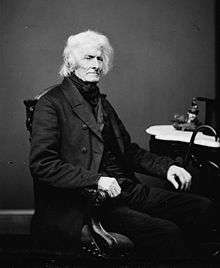William Wilkins (U.S. politician)
| William Wilkins | |
|---|---|
 | |
| 19th United States Secretary of War | |
|
In office February 15, 1844 – March 4, 1845 | |
| President | John Tyler |
| Preceded by | James Madison Porter |
| Succeeded by | William L. Marcy |
| Member of the U.S. House of Representatives from Pennsylvania's 21st district | |
|
In office March 4, 1843 – February 14, 1844 | |
| Preceded by | Thomas M.T. McKennan |
| Succeeded by | Cornelius Darragh |
| United States Senator from Pennsylvania | |
|
In office March 4, 1831 – June 30, 1834 | |
| Preceded by | William Marks |
| Succeeded by | James Buchanan |
| Judge of the United States District Court for the Western District of Pennsylvania | |
|
In office May 12, 1824 – April 14, 1831 | |
| Appointed by | James Monroe |
| Preceded by | Jonathan Hoge Walker |
| Succeeded by | Thomas Irwin |
| Member of the Pennsylvania House of Representatives | |
|
In office 1819-1820 | |
| Personal details | |
| Born |
December 20, 1779 Carlisle, Pennsylvania, U.S. |
| Died |
June 23, 1865 (aged 85) Pittsburgh, Pennsylvania, U.S. |
| Political party | Democratic |
| Alma mater |
Pittsburgh Academy Dickinson College |
| Profession | Lawyer, Judge, Politician |
William Wilkins (December 20, 1779 – June 23, 1865) was an American lawyer, jurist, and politician from Pittsburgh, Pennsylvania. During his career, he served in both houses of the Pennsylvania State Legislature, and in all three branches of the United States federal government, including service as a United States federal judge, as a member of both the House and Senate, and as a cabinet member.
Early life, education, and career
William Wilkins was born in Carlisle, Pennsylvania on December 20, 1779. He attended the Pittsburgh Academy, the forerunner of the University of Pittsburgh,[1] read law in 1801 and graduated from Dickinson College in 1802. He was in private practice in Pittsburgh from 1801 to 1806, then in Lexington, Kentucky from 1806 to 1807, and again in Pittsburgh from 1808 to 1815. He was President, Pittsburgh City Council from 1816 to 1819. He was a member of the Pennsylvania House of Representatives from 1819 to 1820.
Judicial service
Wilkins became a judge of the Fifth Judicial District of Pennsylvania in 1820, serving until 1824. On May 10, 1824, Wilkins was nominated by President James Monroe to a seat on the United States District Court for the Western District of Pennsylvania vacated by Jonathan Hoge Walker. Wilkins was confirmed by the United States Senate on May 12, 1824, and received his commission the same day. He resigned on April 14, 1831, to begin his own term of service in the United States Senate.
Career in national politics
A Jacksonian, he was a United States Senator from Pennsylvania from 1831 to 1834. In the election of 1832, Wilkins received 30 electoral votes from Pennsylvania for the Vice Presidency (the other 189 votes went to the official party nominee, Martin Van Buren).
From 1834 to 1835 Wilkins was Minister to Russia.
After returning to private practice in Pittsburgh from 1836 to 1842, he was elected as a Democrat to the United States House of Representatives, serving from 1843 until resigning in 1844. He resigned to accept appointment as U.S. Secretary of War under President John Tyler.
Later life
In 1845, Willkins returned to the private practice of law in Pittsburgh. He was a member of the Pennsylvania State Senate from 1855 to 1857, and was in private practice of law in Pittsburgh until his death, in 1865. Wilkins died in 1865 in Homewood, near Pittsburgh, Allegheny County, Pa, and was buried in the Homewood Cemetery there. Wilkinsburg, Pennsylvania is named after him. His brother John Wilkins, Jr. served as a Major General in the United States Army. His nephew, Ross Wilkins, was a notable jurist in Michigan.
Wilkins is the namesake of Wilkins Township, Allegheny County, Pennsylvania,[2] while the town of Wilkinsburg, Pennsylvania is named after his aforementioned brother.
References
- ↑ Starrett, Agnes Lynch (1937). Through one hundred and fifty years: the University of Pittsburgh. Pittsburgh, PA: University of Pittsburgh Press. p. 45. Retrieved August 1, 2013.
- ↑ Porter, Thomas J. Jr. (May 10, 1984). "Town names carry a little bit of history". Pittsburgh Post-Gazette. p. 1. Retrieved 26 May 2015.
Sources
- United States Congress. "William Wilkins (id: W000475)". Biographical Directory of the United States Congress.
- William Wilkins at the Biographical Directory of Federal Judges, a public domain publication of the Federal Judicial Center.
External links
- Homewood Cemetery Biography & History
- Dickinson College Biography
- Gravesite Photos
- The Political Graveyard
| Legal offices | ||
|---|---|---|
| Preceded by Jonathan Hoge Walker |
Judge of the United States District Court for the Western District of Pennsylvania 1824–1831 |
Succeeded by Thomas Irwin |
| United States House of Representatives | ||
| Preceded by James S. Stevenson Robert Orr, Jr. |
Member of the U.S. House of Representatives from Pennsylvania's 16th congressional district 1829 (resigned before qualifying) |
Succeeded by Harmar Denny |
| Preceded by Thomas M. T. McKennan |
Member of the U.S. House of Representatives from Pennsylvania's 21st congressional district 1843–1844 |
Succeeded by Cornelius Darragh |
| United States Senate | ||
| Preceded by William Marks |
U.S. Senator from Pennsylvania 1831–1834 Served alongside: Isaac D. Barnard, George M. Dallas, Samuel McKean |
Succeeded by James Buchanan |
| Political offices | ||
| Preceded by James Madison Porter |
U.S. Secretary of War Served under: John Tyler 1844–1845 |
Succeeded by William L. Marcy |
| Honorary titles | ||
| Preceded by Littleton Tazewell |
Oldest living U.S. Senator May 6, 1860 – June 23, 1865 |
Succeeded by Henry Dodge |




